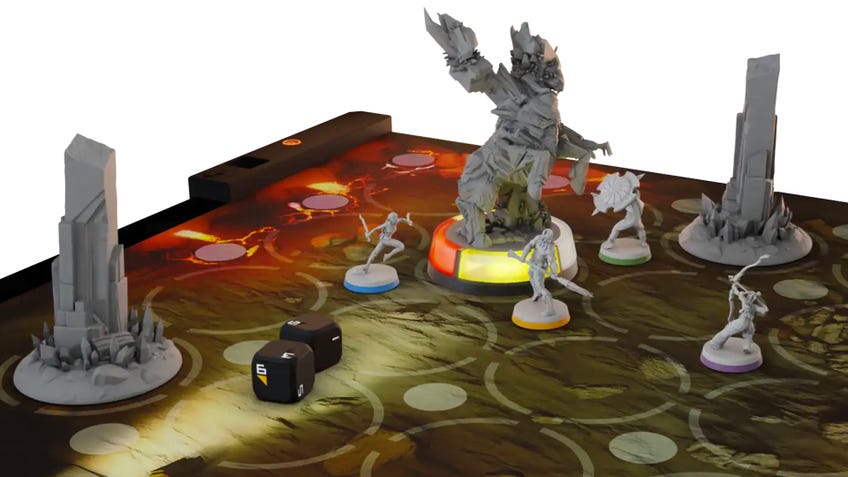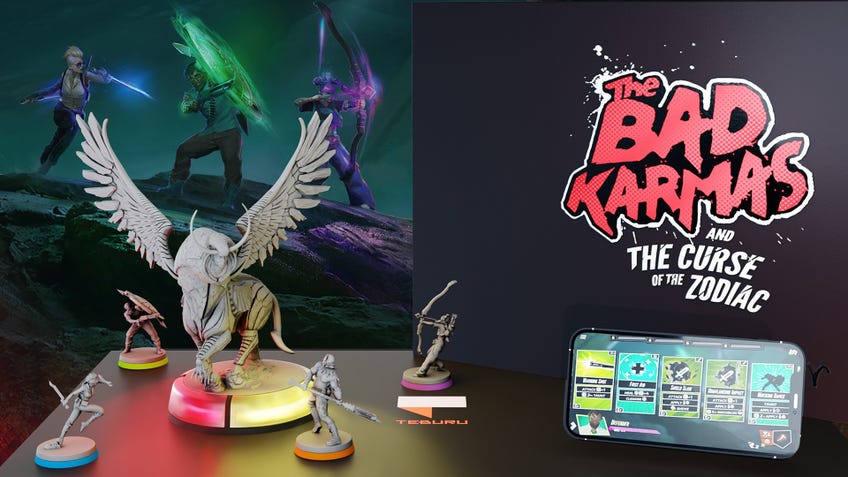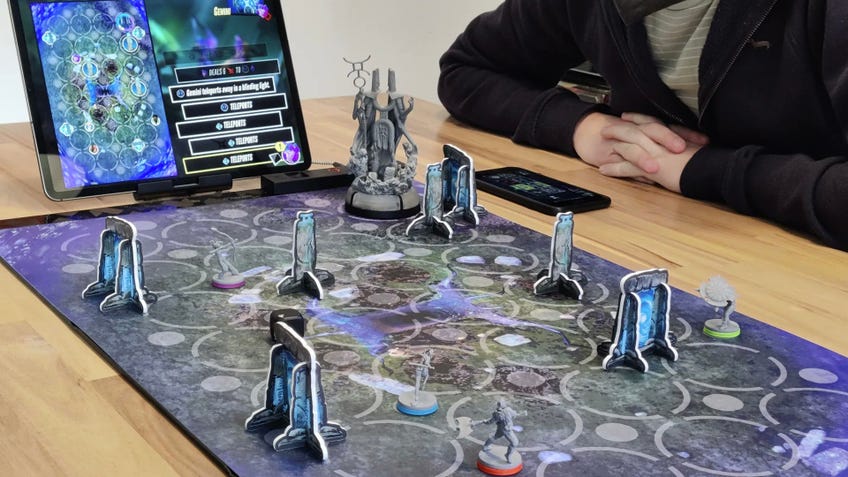Digital without losing the physical, Teburu is a promising next step for hybrid board games
The app-powered board has a lot of potential - if it can find the right games.
Over the years there have been endless attempts to combine the tangibility of physical board games with the convenience and technology of digital apps. Some - such as companion apps for games like Mansions of Madness and Descent: Legends of the Dark - have been fairly successful at augmenting cardboard worlds with digital tools, while others have offered little more than an expensive table-sized tablet screen to awkwardly replace your usual gaming table.
I recently had the chance to try the latest hopeful hybrid of digital and physical gaming, and came away impressed by what I saw - with some question marks remaining around what’s needed to deliver on its ambitious promises long-term.
Teburu isn’t a single hybrid game, but a platform designed to enable any number of board games to take advantage of digital enhancements. The platform itself is akin to a video game console for board games, taking the form of a foldout board that lays underneath a separate game board for each game. A small box runs along one edge, serving as a place to connect devices by tapping them on its sensor and charge an included wireless six-sided die that can be used in various games. The platform then connects wirelessly to a tablet or phone running a dedicated companion app for each game.
At its most basic, the technology uses a combination of three fairly simple bits of tech: Teburu’s own sensor-equipped board, the game’s companion app and a series of RFID tags that can be embedded in miniatures, tokens or anything else that sits on top of the game board.
The platform itself is akin to a video game console for board games.
The relative simplicity of the tech means that Teburu is fairly flexible, allowing it to support a variety of potential game types. While a full game board with minis on top is one option, the sensor-packed board underneath can also track individual tiles - like those used in Carcassonne or Betrayal at House on the Hill - or another layout of components.
I was given a demo of developer Xplored’s debut Teburu game, The Bad Karmas and The Curse of the Zodiac, a boss-battle game that sees players moving character miniatures around a board while fighting a huge monster inspired by one of the twelve astrological signs. Each player could view and select their character’s available actions on a smartphone ‘controller’, while a separate tablet displayed the overview of the board, player turn order and the remaining health of the boss. (It’s also possible to pass-and-play using a single device.)

While actions were selected on a screen, players still needed to move the plastic figures around the board itself as directed by the app, with the computer also controlling the zodiac figure - in the case of our playthrough, a lava-spewing Aries. The boss’ facing could affect the damage inflicted by players, with the base for the miniature displaying four light-up quadrants that indicated weaker sides exposed by player attacks.
The use of sensors and tags in the miniatures and board to feed back automatically meant that the gameplay flow was faster and less fiddly than other companion apps, as actions on the board were reflected directly on screen without the players needing to tell the app what had just happened or where things sat on the board. Even rolls for attacks and dodges are sent straight to the app through the digital dice, resolving with no extra admin from the players.
Other events were triggered automatically by the game as players or the boss moved onto certain spaces - such as stunning the hulking monster with a beam of sunlight visible on the physical board itself, or taking extra damage from spots marked with orange lava - making for an inventive blend of physical visuals and digital automation. If the players decided to take a break, the app could save the game layout, providing a quick way to set things up and resume next time around.
At the end of our game, the app displayed an overall score and a set of stats for each character, along with titles based on how we’d performed behind-the-scenes - ‘MVP’, ‘Monster Slayer’ and ‘Punching Bag’ among them. It’s a neat touch that will be familiar to any player of online video games, offering something that would be too unwieldy for a normal board game to keep track of.

The Bad Karmas was enjoyable as a proof-of-concept, but it’s not necessarily a game that demands Teburu’s €170 price of entry - which includes both the main platform and four of Bad Karmas’ dozen boss fights - by itself. (As per Teburu’s Kickstarter campaign, €290 will get you all 12 zodiacs - plus a bonus 13th boss - plus some extra dice and other stretch goals.)
It’s a very ambitious vision, but one that left me genuinely excited by the possibilities.
However, it did show the potential for Teburu to successfully introduce the perks of digital gaming to a board game without taking away part of what makes analogue gaming so uniquely appealing: filling a table with cardboard, moving miniatures with your hands, watching dice clatter. In other words, the truly hands-on nature of tabletop games.
Xplored CEO Davide Garofalo offered some examples of what Teburu could offer in the future, taking its digital ambitions far beyond automatic calculations, audio effects and DLC. Imagine the option to play a board game remotely over the internet with friends while still using physical pieces, the chance for separate groups of players to influence a shared game world - for example, by changing what other players may discover in a dungeon after they’ve emptied its treasure chests - computer opponents that develop new strategies through machine-learning and large-scale community events closer to those seen in MMOs and other video games. It’s a very ambitious vision, but one that left me genuinely excited by the possibilities.
There are already hopeful signs that Teburu will grow quickly beyond the solid - if fairly familiar - foundation shown in The Bad Karmas, with the announcement of upcoming board games set in the universe of gothic RPG Vampire: The Masquerade and the World of Darkness, as well as a title based on fantasy dungeon-crawler Sword & Sorcery. The Vampire: The Masquerade game is described as being a very different experience from Bad Karmas, involving social deduction elements and hidden goals enabled through the app.
While original releases designed specifically for the platform will hopefully push its technological prowess to the max, it’s also exciting to consider what existing board games might gain from coming to Teburu - whether that’s as simple as being able to run your ongoing D&D campaign over the internet with real miniatures, speeding up maths-heavy strategy games or even putting multiple boards side-by-side to host a vast battle in Warhammer or another wargame.
Teburu will ultimately be as good as the games it allows people to play.
Big names aren’t the only draw, either. Garofalo describes Teburu as ultimately being an “open platform”, with the team hoping to make a development kit available to both major publishers and smaller creators looking to bring their games to the platform in the future - helped by the flexible nature of the technology used, which could allow players to use existing pieces and tags to play a variety of games.
Like any platform, Teburu will ultimately be as good as the games it allows people to play. From my time with it, the technology and experience show plenty of promise, and it’s clear the team have lofty goals for its future. Now, it’s a case of proving that the platform is worth the investment - for those both making and playing games. With the right library of titles, it could well prove to be the crossover that finally convinces naysayers that digital and physical can work in harmony.
Unlike a number of hybrid board games, Teburu appears to understand what makes digital games and tabletop games so appealing separately, aiming to offer the best of both worlds without holding either back. Here’s hoping it delivers on that promise.


